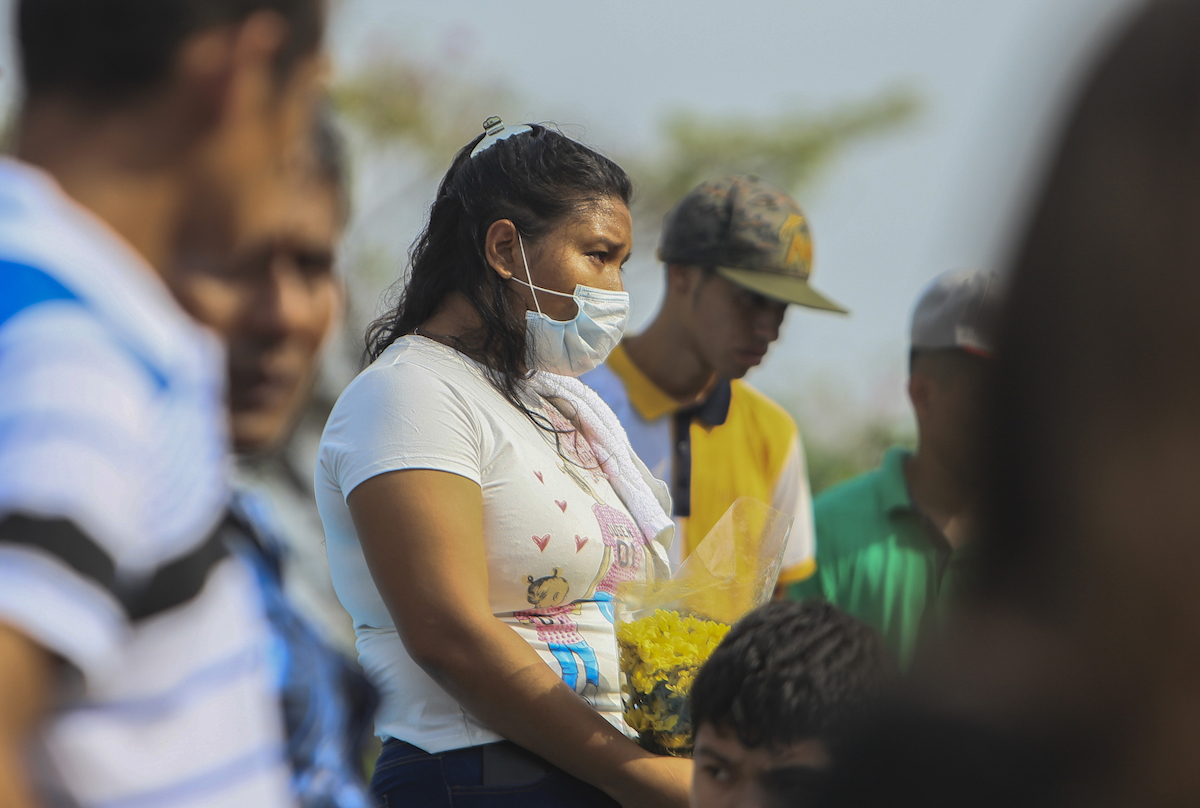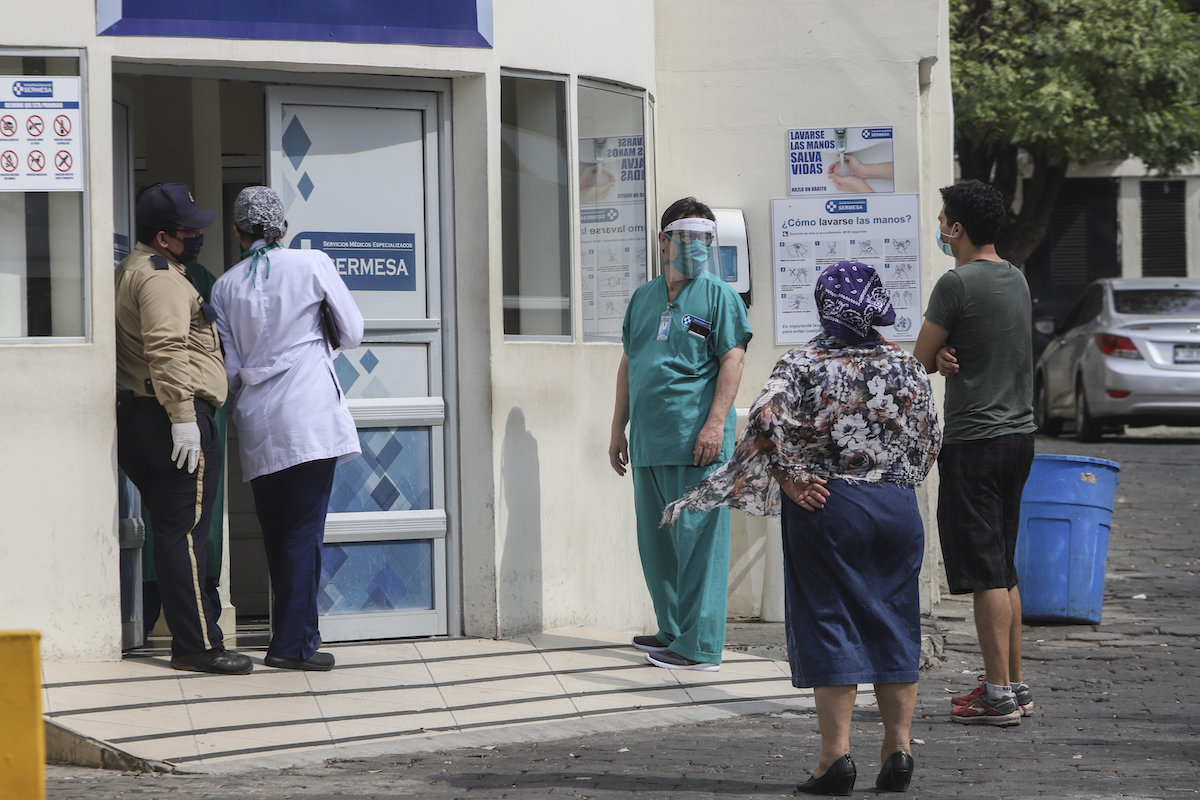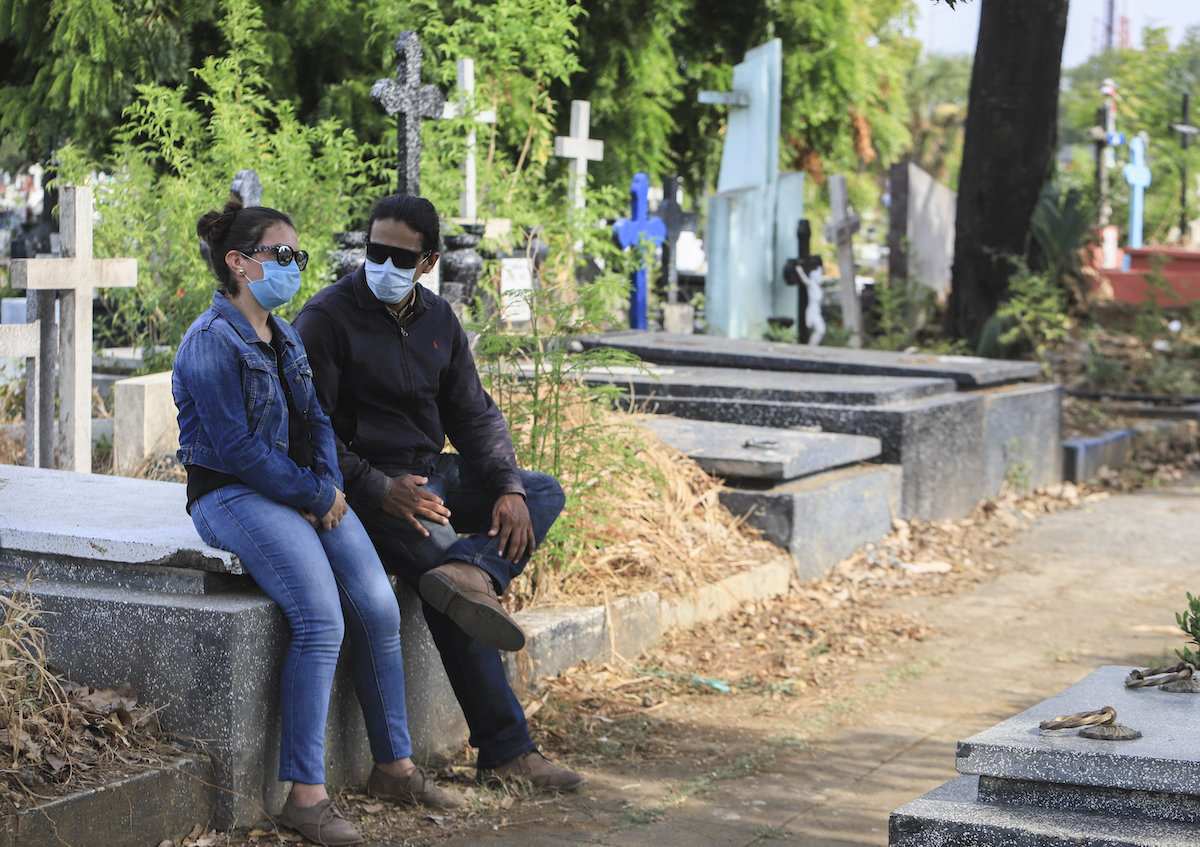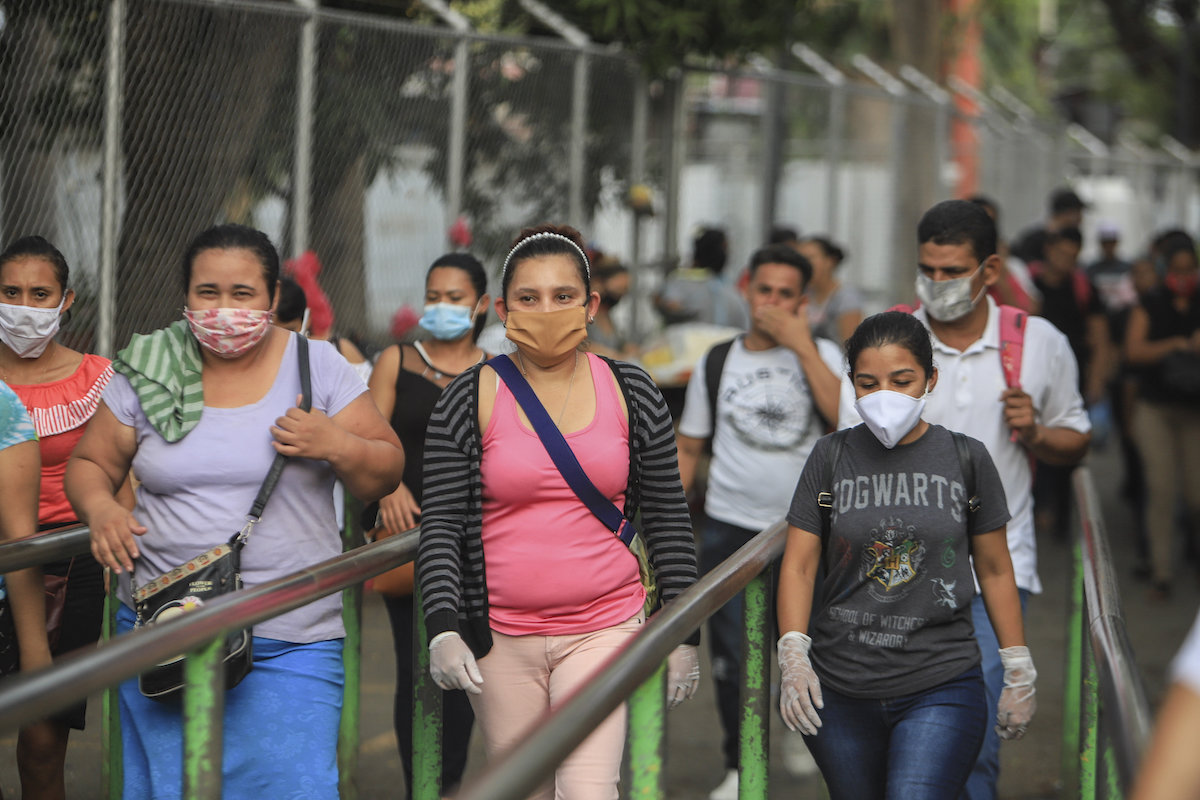

A woman wears a mask as she attends a funeral in Managua, Nicaragua, Monday, May 11, 2020. (AP Photo/Alfredo Zuniga)
By GABRIELA SELSER, Associated Press
MANAGUA, Nicaragua (AP) — Roger Ordoñez was hospitalized with breathing problems last week.
When his son Enrique came to visit the next morning, the 69-year-old retiree was already being buried by government workers in protective white full-body suits in a cemetery on the outskirts of Chinandega, a city of 133,000 people in northwest Nicaragua.
The hospital warned the Ordoñez family to self-quarantine for two weeks but said their patriarch did not have the novel coronavirus, even though they were shown no test results.
President Daniel Ortega’s government has stood out for its refusal to impose measures to halt the coronavirus for more than two months since the disease was first diagnosed in Nicaragua. Now, doctors and family members of apparent victims say, the government has gone from denying the disease’s presence in the country to actively trying to conceal its spread.
“I begged the doctor to tell me what happened to him,” Enrique Ordoñez said. “I needed to know if he was infected. I have an 18-month-old girl, my mother has a variety of ailments and we need to know if it was COVID.”
The government says this country of 6.5 million people has seen 16 coronavirus cases and five deaths since its first case was diagnosed. Businesses and government offices remain open and the government has actively promoted sporting events and other mass gatherings.


A medical worker wears a mask and a face shield at the entrance of the SERMESA hospital in Managua, Nicaragua, Monday, May 11, 2020. (AP Photo/Alfredo Zuniga)
The nongovernmental organization Citizen Observatory made up of health workers and activists, said it had identified 1,033 suspected COVID-19 infections in the country through Saturday.
Nicaraguan epidemiologist Alvaro Ramírez, currently living in Ireland, said the number is already far higher and coming days “will be decisive” for Nicaragua.
He calculates that in two weeks Nicaragua could have some 18,000 infections, of which 890 would be serious.
Plainclothes police and government supporters have detained journalists outside a hospital in Managua and in a cemetery in Chinandega in the past week.
But in Chinandega the pandemic is becoming difficult to hide. White-suited men in pick-up trucks with coffins in the bed have become a more common sight in recent days, residents say. And it seems everyone knows someone who got sick.
A Chinandega doctor, who requested anonymity to avoid retaliation, said she knew four people who had died, including one of her patients, who was buried within two hours of dying.
“Everyone they consider a suspected patient who has died of atypical pneumonia they send for immediate burial,” she said.
Diagnoses are made based on symptoms and X-rays of patients’ lungs, because tests for the virus are tightly controlled by the Health Ministry and difficult to obtain.
An informal network of medical colleagues in the city had tallied 25 suspected COVID-19 deaths through Sunday, she said.
Ordoñez, an appliance sales executive, said his father suffered from chronic ailments, including hypertension and respiratory problems, but that last week from one day to the next he suddenly struggled to breath. He took him to the hospital Thursday evening and he died that night.
“The hospital organized everything,” Ordoñez said. He had shown up early Friday morning to ask about his father’s condition, but they told him he was already being buried.


A couple wear masks as they attend a funeral at the Central cemetery of Managua, Nicaragua, Monday, May 11, 2020. (AP Photo/Alfredo Zuniga)
“I tried to identify the grave the best I could, because there are other bodies there,” he said. “But we can’t raise our voices much. Fear is pervasive in our country.”
If something else killed him, then why did the hospital bury him without letting his family be present and why did doctors tell Ordoñez to self-quarantine for two weeks, he wondered.
Neighboring Honduras and El Salvador have taken strict measures to try to slow the virus’ spread. Honduras has about 2,000 confirmed infections and El Salvador has about 1,000. Costa Rica has more than 800.
A request for comment from Vice President Rosario Murillo, the government’s spokeswoman and Ortega’s wife, was not answered.
But it appears the government is beginning to recognize what is coming.
At the end of April, the Health Ministry called a meeting of all the hospital directors and top-level health officials at ministry offices.
“They told them this is getting serious, that every hospital needs to prepare,” said Róger Pasquier, president of the Nicaraguan Anesthesiology Association. “This call is very late. They didn’t take isolation measures, they haven’t protected health workers, there aren’t sufficient beds in any Managua hospital, nor any regional hospital.”
“Contrary to what is shared officially, I know through my medical colleagues that we have a great number of people sick in Managua, Masaya, Matagalpa and Chinandega, where there is an outbreak that could be very dangerous,” Pasquier said.
Many doctors fear speaking publicly, because of government retaliation. Pasquier said he was speaking freely “because I’m not being political; we just want to save lives in a dramatic moment for the world.”


Workers wear masks as a protection against the spread of the new coronavirus as they leave from a day’s work in Managua, Nicaragua, Monday, May 11, 2020. (AP Photo/Alfredo Zuniga)
A doctor at another hospital for the National Police in Managua said there were 18 patients there with suspected COVID-19 infections. None had been tested, but were diagnosed based on symptoms and lung x-rays, said the doctor who requested anonymity because she was not authorized to speak.
José Antonio Vásquez, president of the Nicaraguan Medical Unit, an organization of doctors that formed after the protests of April 2018, said the group had identified 42 doctors, nurses and technicians who have suspected infections.
In Chinandega, fear has deepened in recent days, a combination of more frequent sightings of the white-suited men in pickups and recent deaths of a couple of well-known local figures. The area has sea connections to El Salvador and a corridor for truck cargo with Honduras. Local officials have said nothing.
The local doctor said it appeared as though from Friday to Monday more than half of the city’s formal businesses had closed. Doctors, nurses and technicians at the public hospital have been infected due to a lack of protective equipment and early recognition.
“If we manage to survive this, it’s because God is great,” the doctor said. “There’s no other explanation.”
“There’s a lot of nervousness here,” said university student Pablo Antonio Alvarado, mentioning a couple acquaintances in Chinandega he heard were infected. “They say we’re the epicenter of the pandemic, like Wuhan in China.”
He described the white-suited men riding with coffins in pickups as looking like “astronauts.” The Chinandega doctor said they were hospital orderlies given the task of quickly disposing of the dead.
Ordoñez was left with more questions than answers about his father’s death. “The doctor told me (the virus) was dangerous,” while also insisting the elder Ordoñez didn’t have it, he said.
“I didn’t bury him, they buried him,” Ordoñez said. “And before, they had buried others, at dawn, because beside him there were seven or eight more graves.”
***
AP writer Christopher Sherman in Mexico City contributed to this report.



[…] 25 confirmed COVID-19 cases and eight deaths, far lower than other countries in the region. Reports have emerged of “express burials” carried out by public hospitals without families being present and growing numbers of deaths […]